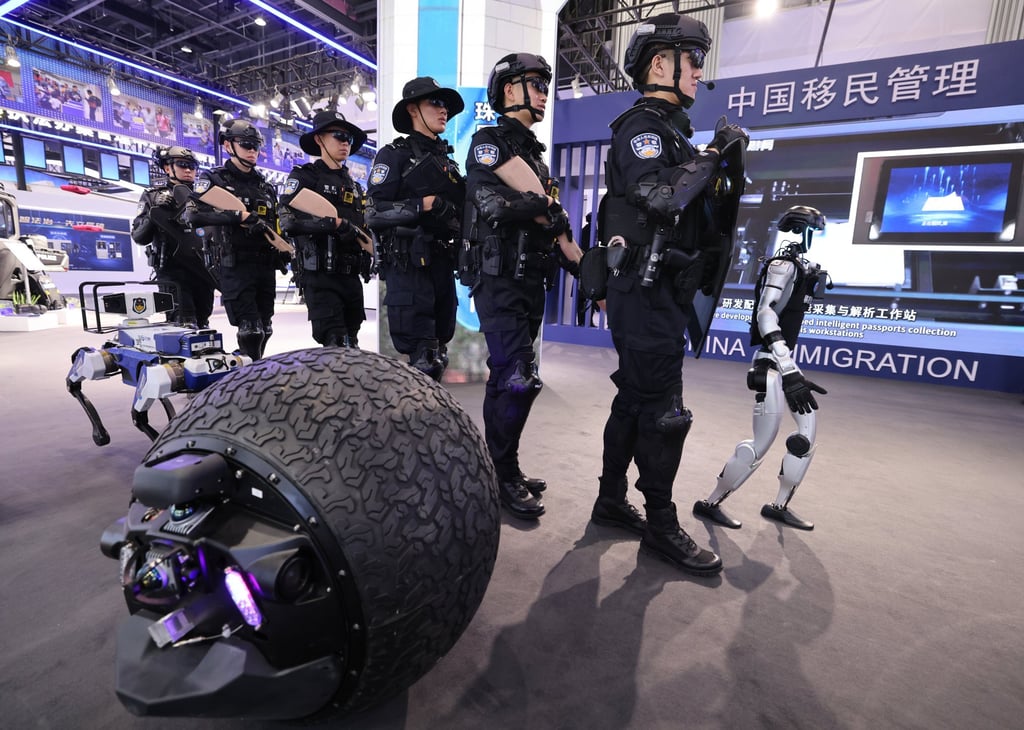Annual policing tech expo offers glimpse of law enforcement future as Beijing ramps up domestic security drive amid ‘lone wolf’ attacks
The future of policing in China will be powered by artificial intelligence surveillance tools that can monitor Telegram and VPN users, as well as DeepSeek-inspired models that can analyse leads for investigations, according to exhibitors at an annual policing expo in Beijing.
The surveillance equipment was showcased this week at the 12th China International Exhibition on Police Equipment, which ended on Saturday.
The event – the largest policing technology expo of its kind – offered police and defence equipment suppliers from across the country a chance to compete for orders from public security departments
The suppliers included research institutes affiliated with the Ministry of Public Security – the country’s top police agency – as well as various private companies.
AI technology was a key selling point for products at the expo, including surveillance tools, criminal investigation devices and drone-jamming equipment.
One of the technologies showcased was the “multidimensional intelligence analysis of individual extreme behaviour”, presented by the Third Research Institute of the Ministry of Public Security.
China has faced security challenges in issuing early warnings for “individual extreme incidents”, according to the institute.
The institute has developed AI models to analyse shopping records, search histories, and social media posts to identify high-risk individuals.
The institute said the tool was developed based on the AI agent service by Chinese start-up Dify, an open-source large language model (LLM) application development platform.
Several “lone wolf” attacks over the past year have shocked the Chinese public. The worst attack happened in November, when a man named Fan Weiqiu drove an SUV into a crowd outside a sports centre in the southern city of Zhuhai, killing at least 35 people and injuring at least 43.
Fan was executed in January.
Since that attack, Beijing has repeatedly stressed the need to maintain social stability, urging local officials to identify people prone to carrying out such “extreme incidents”.
The official research institute also showcased AI-assisted mobile phone forensic tools and fugitive tracking systems.

Many manufacturers highlighted the security of police equipment as a key selling point.
One company claimed that its tool could monitor police equipment usage, particularly internet usage, to swiftly detect the “illegal publication, transmission, storage or processing of confidential information”, thereby “ensuring the confidentiality and security of state secrets and police work”.
Last year, Beijing made significant revisions to expand the scope of a law intended to protect state secrets.
Subsequent government regulations urged manufacturers to “utilise new technologies, methods and processes to innovate security and confidentiality products, as well as confidential technical equipment”.
The regulations, which came into effect in September, promised rewards for individuals and organisations that “contribute significantly” to the development of such technologies.
Confidentiality was also a theme at this year’s exhibition.
Visitors had to apply to attend the exhibition using a QR code. They were required to provide their real name and ID number, then go through a screening process before being permitted entry to the expo.
Many prospective buyers at the exhibition were wearing police uniforms, and some exhibitors required visitors to show their police ID before being allowed to photograph their products. In some cases, manuals were restricted to police officers for products that could only be bought by law enforcement agencies.
“Without cybersecurity, there is no national security” read a prominent slogan in the exhibition hall.
The Third Research Institute of the Ministry of Public Security showcased a tool that it claimed could monitor Telegram, a widely used instant messaging app known for its privacy and security. It said the tool could monitor Telegram accounts registered with Chinese mobile phone numbers, which have strict real-name requirements.
To date, the tool has collected more than 30 billion messages and monitored 70 million Telegram accounts, as well as 390,000 public channels and groups, according to the institution.
A promotional video from the institution showed how drug transactions could be monitored in group chats by logging into Telegram with a hacked Chinese mobile phone number.
It also said that messages on Telegram involving topics related to politics and Hong Kong could be monitored. The institute cited the widespread use of Telegram by anti-government protesters in Hong Kong in 2019 as one of the reasons for developing the tool.
In mainland China, internet users have to use virtual private networks (VPNs) to access Telegram, as well as the website for the South China Morning Post. But a technology company from the eastern city of Nanjing showcased a tool capable of detecting such use.
Several other companies promoted large models for police use and emphasised their products were based on Chinese open-source models such as DeepSeek. They said these AI models could help the police analyse leads more effectively, manage devices, investigate crime scenes and interrogate suspects.
A Beijing-based company claimed that its AI tool could conduct real-time psychological tests on suspects to facilitate “intelligent interrogation” and swiftly “break through their psychological defences”.
Large tech companies such as Huawei, iFlyTek and Hikvision also promoted their AI models as being suitable for use in law enforcement scenarios.
Source: https://www.scmp.com/


